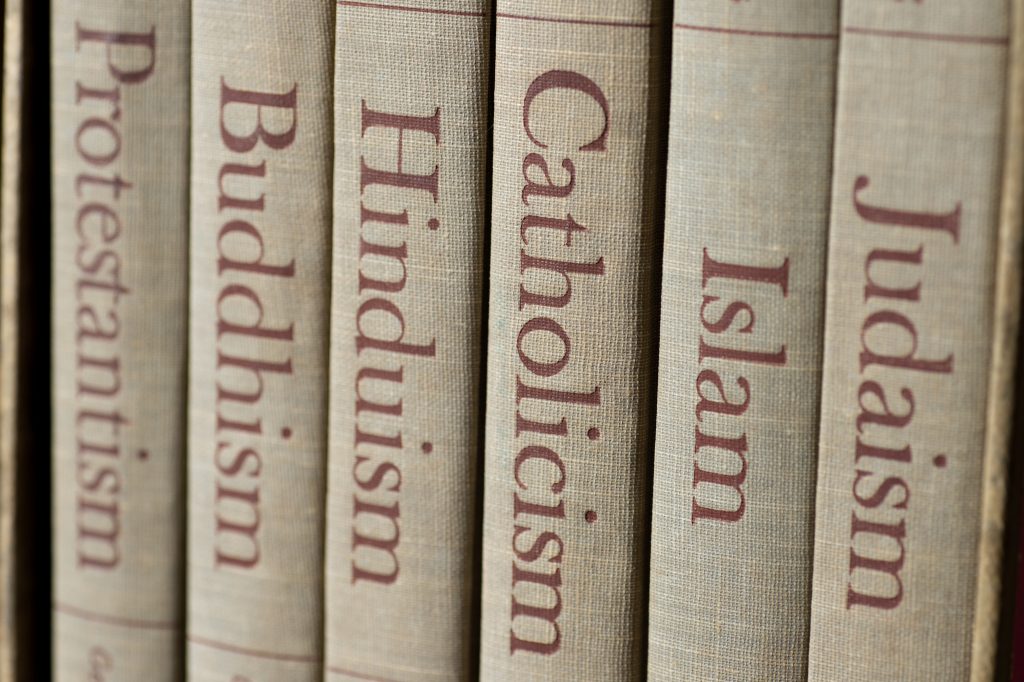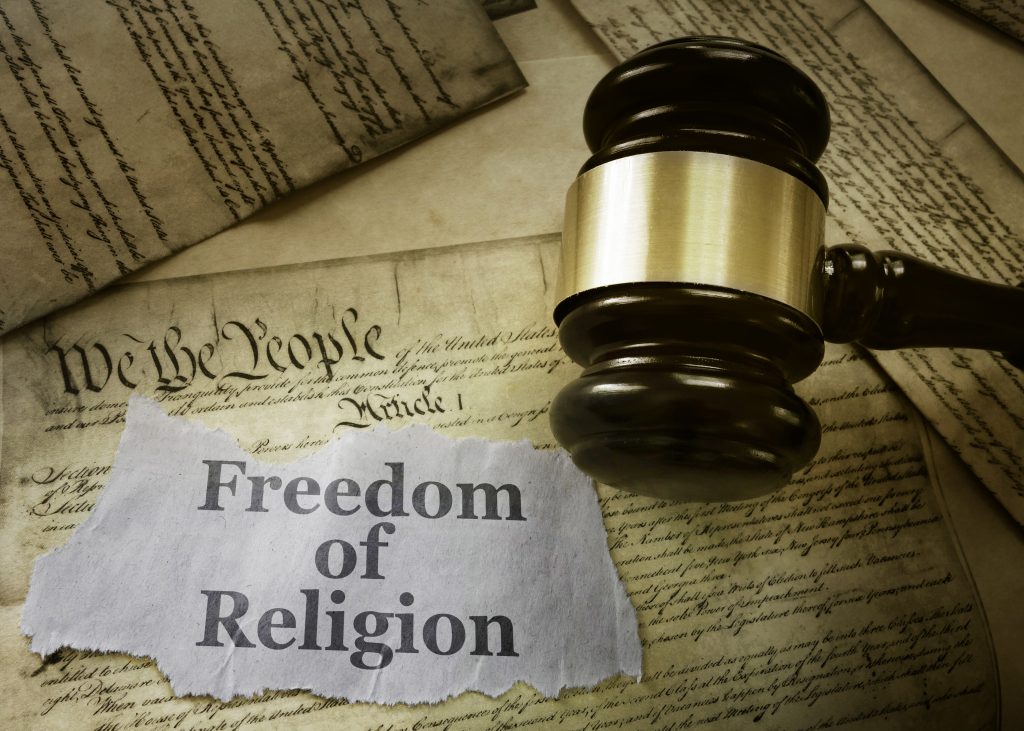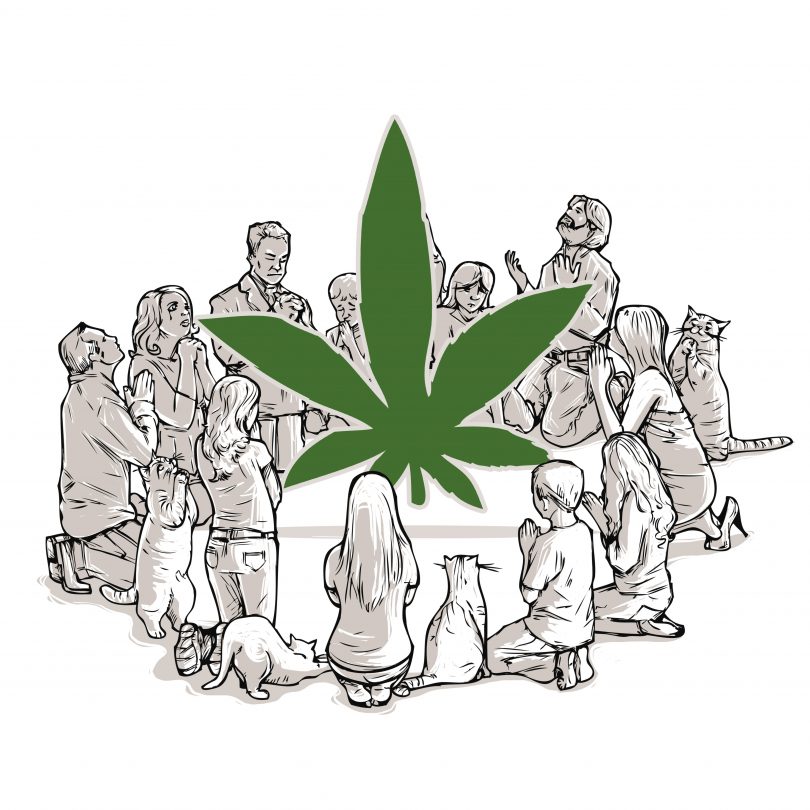There are a lot of different religions out there. Apart from the numerous and varied beliefs people have on their own, there are a ton of registered religions that are considered official religions by the country legally. You don’t have the option of just Christian or Jew, Muslim or Mormon, Scientologist or Pastafarian. Nope, these days you can be a part of the First Church of Cannabis. So if you believe, if you really, believe, keep on reading…
Freedom of religion is important, and the First Church of Cannabis is a trailblazer in cannabis for religious purposes in the US. I expect many more such churches will be popping up, and for good reason! We’re dedicated to following this growing industry, so make sure to subscribe to The THC Weekly Newsletter for all the best stories, as well as exclusive deals on flowers, vapes, edibles, and many more products! Also save big on cannabinoids like HHC-O, Delta 8, Delta 9 THC, Delta-10 THC, THCO, THCV, THCP & HHC by going to our “Best-of” lists!
What is a religion?
This might sound like a silly question at first, but it’s actually not. There are two ways of looking at this. The first has to do with a system of belief, and can be described in different ways. Many definitions rely on the idea of a supreme being, like this one: “an organized system of beliefs, ceremonies, and rules used to worship a god or a group of gods.” To something less concrete like this one: “a specific fundamental set of beliefs and practices generally agreed upon by a number of persons or sects.”
Sometimes definitions involve explanations for life and the universe as we know it, some definitions are more centered around an all-knowing being, and some rely on the idea of a group of people seeing something similarly and acting similarly. While some people take the idea of religion very seriously, others do not. And while some go to meeting places like churches, synagogues, or mosque’s daily to celebrate their beliefs, some avoid such places all together.
There is another way to look at religion, though, and that involves legalities. While anyone can technically open a place of worship for whatever they want, a ‘registered church’ is an incorporated church, which is registered with the secretary of state for whatever state it operates in, and which is then eligible for tax-exemption status by the US federal government. None of this is a legal requirement to worship, of course, but to be considered a ‘legitimate’ place of worship, in the eyes of many this is necessary.

So what does a place of worship need to do to get this tax-exempt, and more ‘official’ status? Well, a lot of it has to do not with belief, but with tax collection, and the IRS. The IRS has a specific tax code for churches, aka ‘places of worship’. And if the IRS (not some divine body) deems that the place of worship ticks the correct boxes of things, like having a religious history, a place for prayer, regular congregations and services, a legal existence, and a set of rules it goes by, then it might be able to get out of paying taxes.
In fact, all that was just said, also applies to ‘religious organizations’ which aren’t where people worship, but which push some kind of religion, whether scholastically, or for some other purpose. Regardless of how broad that is, and how easily it can be manipulated, whether a ‘house of worship’, or a ‘religious organization’, in order to get the tax exempt status, and the more official ‘go-ahead’ by the federal government through the IRS, it must meet the five following needs:
- The organization must be centered around providing religious, scientific, educational, or charitable reasons – only.
- There can be no real income made that benefits shareholders or private individuals.
- The organization CANNOT put a ‘substantial’ amount of time and energy into influencing politics.
- It can’t have anything to do with political campaigns
- All operations and activities must be legal and not break with public policy.
First Church of Cannabis
In March of 2015, the US’s First Church of Cannabis was founded by Bill Levin in Indiana. The First Church of Cannabis is a registered church that Levin claims received its IRS tax-exemption status around 30 days after filing.
Levin, himself, serves as the highest holy official of this church, and goes by the name ‘Grand Poobah’. That name, if it sounds familiar to anyone, was taken from the Flinstones, where it comes up repeatedly as an elected official in a secret society called the Loyal Order of Water Buffaloes. Churchgoers are required to pay a monthly fee of $4.20.
Services are held every Wednesday at 7, at a former Christian Church in Indianapolis. And the church holds 12 commandments, which it calls the “Deity Dozen”, and which go as follows:
- Don’t be an a-hole. Treat everyone with love as an equal.
- The day starts with your smile every morning, when you get up, wear it first.
- Help others when you can. Not for money, but because it’s needed.
- Treat your body as a temple. Do not poison it with poor quality foods and sodas.
- Do not take advantage of people. Do not intentionally hurt anything.
- Never start a fight … only finish them.
- Grow food, raise animals, get nature into your daily routine.
- Do not be a “troll” on the Internet, respect others without name calling and being vulgarly aggressive.
- Spend at least 10 minutes a day just contemplating life in a quiet space.
- When you see a bully… stop them by any means possible. Protect those who cannot protect themselves.
- Laugh often, share humor. Have fun in life, be positive.
- Cannabis. “the healing plant” is our sacrament. It brings us closer to ourselves and others. It is our fountain of health, our love, curing us from illness and depression. We embrace it with our whole heart and spirit, individually and as a group.

The first planned service was on July 1st, 2015, and was met with some fanfare including law enforcement and local Christian protesters. The idea had been to use cannabis at that first service, but the heat got in the way, and no cannabis was used at all. The service included the likes of comedy, live music, and dancing, and was garnished by food trucks, and tables selling items like stickers and T-shirts.
The police restricted parking, claiming it had to do with enforcing a law about parking on roads no wider than 24 feet, and some locals blocked parking as well. Others allowed parking for a fee on their properties. For that first service, city officials installed a security camera outside the church which they argued was for public safety. Levin’s response? “I find it flattering. If you think we are important enough to install a camera so you can have a guy watch us 24 hours a day, good! Good! You’re spending our Hoosier tax money proper.”
Why did the First Church of Cannabis come into existence?
Levin himself grew up as a Reform Jew, and was inspired to start the First Church of Cannabis as a response to Indiana’s Religious Freedom Restoration Act, which was approved in March 2015, and went into effect July 1st, 2015. This law “allows individuals and companies to assert as a defense in legal proceedings that their exercise of religion has been, or is likely to be, substantially burdened.”
So what does this mean, and how is it different from the US’s own similar policy with the same name? While some say Indiana’s bill is likewise in that it “prohibits the government from substantially burdening a person’s ability to practice his or her religion — unless the government can show it has a compelling interest to do so.”
Others say the Indiana bill specifically “protects the exercise of religion of entities, which includes for profit corporations.” And that it can “grant religious liberty rights to any corporation, any group of people and any business, regardless of whether or not members of that corporation or business share a religious belief.” This means that anything can have a religious right, and can use that right legally.
Now think of someone who works for a bakery who doesn’t want to serve a gay man because being gay goes against the bakery owner’s religion. A law like this opens the door to close it in the guy’s face. Which, of course, opens the door to civil rights litigation. It should be remembered, neither the federal version or Indiana’s version are supreme court rulings.

Legal encounters
Cannabis is not legal in Indiana for medical or recreational use. However, that pesky bill, the Religious Freedom Restoration Act, should technically work to allow the use of cannabis legally for religious purposes. This discrepency ended up causing legal conflict.
After the first service took place, Levin and the Church sued both Indiana and Indianapolis, with the claim that the state’s cannabis laws infringed on their religious beliefs. The case was dismissed on summary judgement originally, and then dismissed again on appeal.
While this didn’t work out the way Levin and congregation had hoped, there are two things to keep in mind. The first is that neither of those rulings was a Supreme Court ruling, meaning these ideas can still very much be challenged, and judged as unconstitutional. And second, this is just Indiana, and there are plenty of other more accepting states in the US. Like Denver, home of the International Church of Cannabis, which opened its doors on April 20th, 2017.
Conclusion
It says quite a bit about the contradictory nature of a government, that it can pass a law that rather explicitly sets things up for discrimination based on religious beliefs, and then doesn’t back up its own law in court when its challenged by an alternate religious belief, that it technically should be defending.
Such is America. Or maybe just politics in general. Looks like a new trend starting though, and much like the other cannabis trends which have expanded the industry, so might the use of cannabis religiously. Other countries are already bowing to the understanding of a need to allow such use religiously, like with Rastafarians in Jamaica, or the Mahashivaratri festival in Nepal. Considering how fast America is moving toward acceptance, there could well be a religious exemption coming soon to the US too. Stay tuned to life to see what happens next.
Welcome! You’ve arrived at CBDtesters.co, your one-stop-shop for the most relevant and important cannabis and psychedelics-related news going on today. Join us frequently to stay informed on the always-moving universe of legal drugs and industrial hemp, and sign up for The THC Weekly Newsletter, to ensure you never miss a single thing.
Disclaimer: Hi, I’m a researcher and writer. I’m not a doctor, lawyer, or businessperson. All information in my articles is sourced and referenced, and all opinions stated are mine. I am not giving anyone advice, and though I am more than happy to discuss topics, should someone have a further question or concern, they should seek guidance from a relevant professional.







